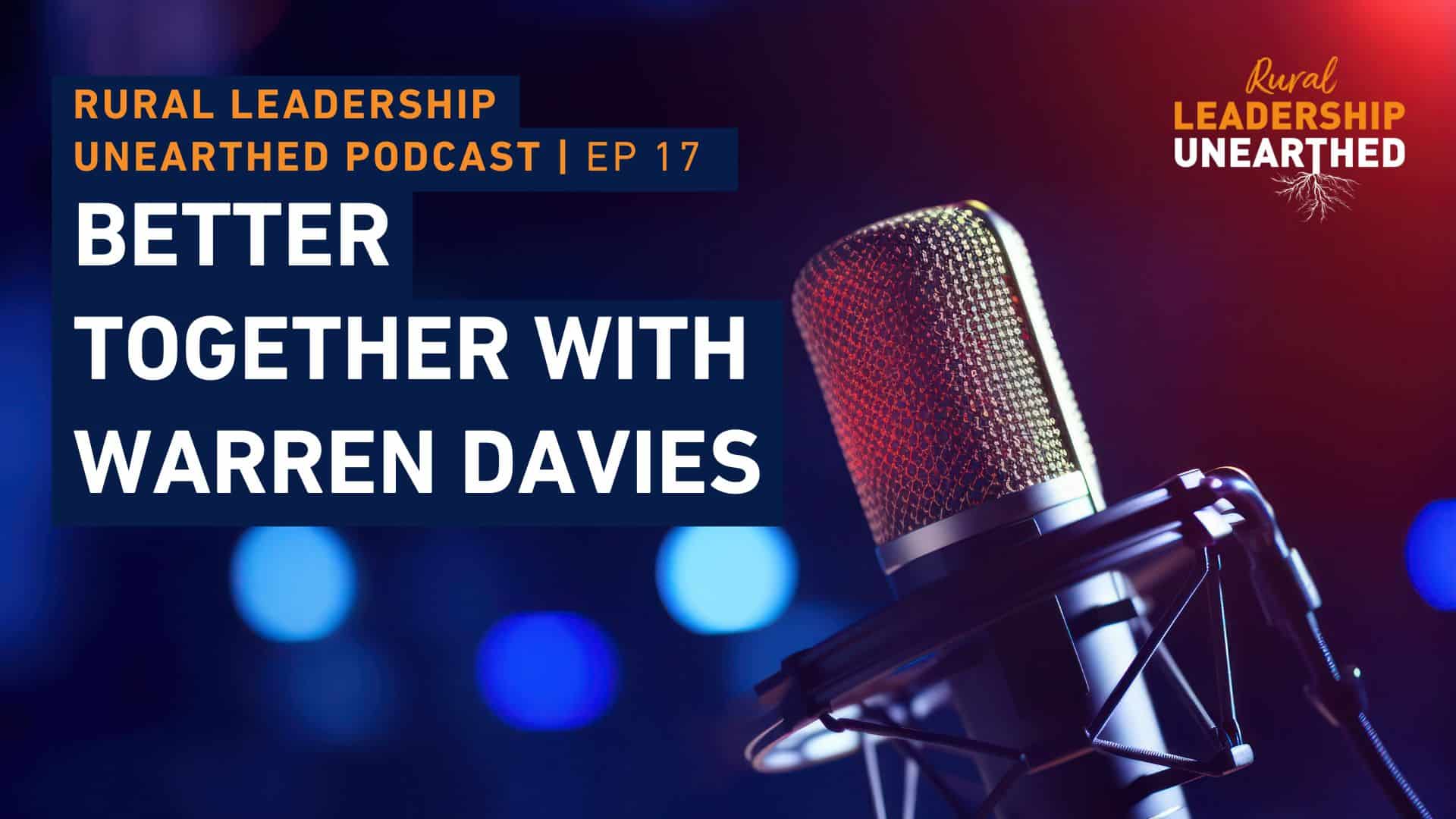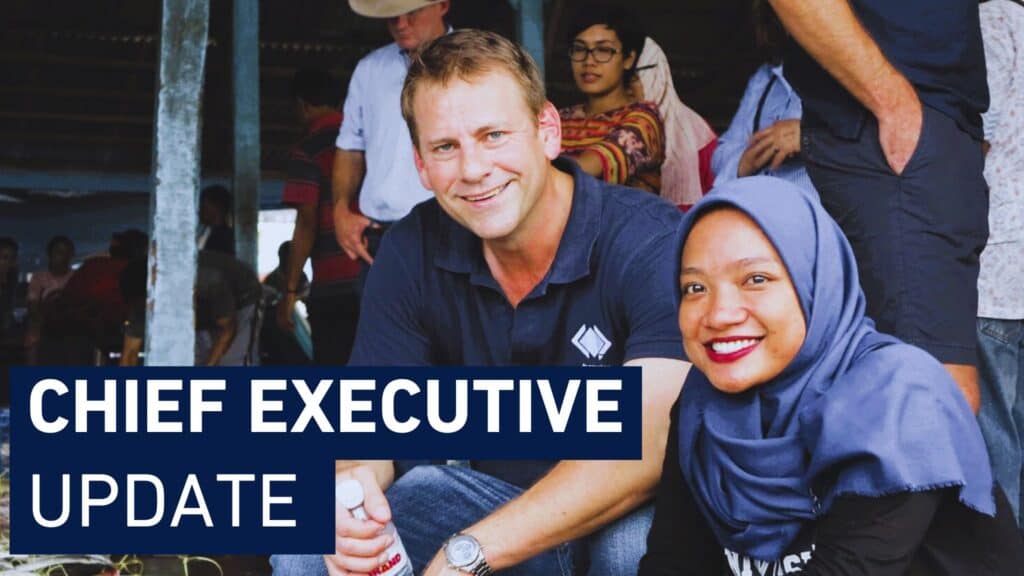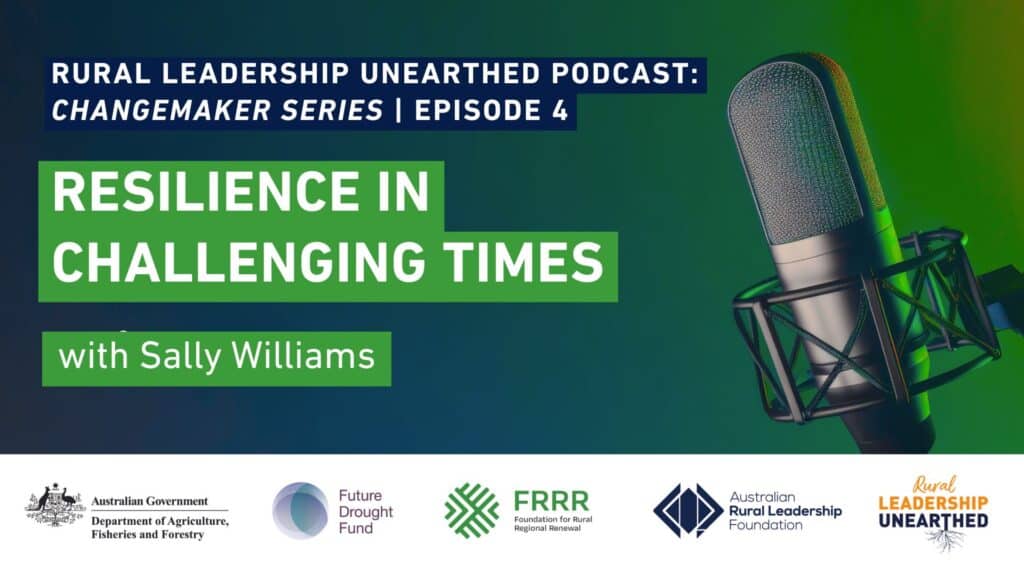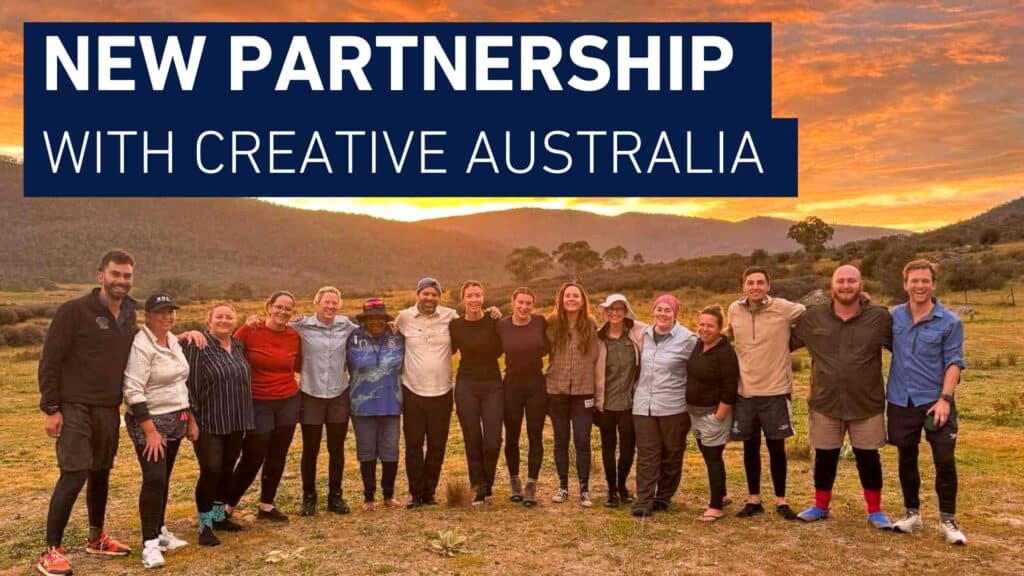In the latest episode of the ARLF podcast Rural Leadership Unearthed, the Unbreakable Farmer, mental health crusader Warren Davies, speaks to us about the insights and stories he feels privileged to share in as he travels around rural Australia. He reflects on the forces buffeting the communities he speaks to, and particularly the impact that the rapid transition to renewable energy sources is having throughout country Australia.
In this conversation, Warren gives insight into what he is seeing and hearing as many farmers, families and towns face circumstances they’ve never come up against before. He shares what he sees as the key ingredients to navigating the things we can’t control and staying connected so that we can support each other.
Warren’s message of communicating, connecting and reaching out for help is cemented on the foundation of his own battles as a farmer suffering from mental ill health and how he has harnessed his story to help others.
Please note: Warren is sharing his personal experiences and anecdotes as he travels around the country speaking with hundreds of rural communities. We acknowledge that there are a whole range of different experiences wherever energy projects are rolling out, and they are all unique in their impact.
Claire Delahunty: Do you mind just introducing yourself and what you do?
Warren Davies: I’m known as the Unbreakable Farmer. I’m a mental health advocate and speaker and I use my platform to be an advocate for the communities that I work in. Particularly over the last five or six years I’ve worked really heavily in the disaster recovery space.
Through the work that I do, obviously focusing on mental health and wellbeing in rural and regional communities, you hear some stories. There’s some challenges especially in that disaster recovery space and even long-term, so I do hear some really challenging conversations.
I feel really privileged that I get the opportunity to hear that. I did a thing with the Buloke Shire in the Wimmera Mallee area of Victoria. And we did a thing called the ‘paddock run’. They’ve run that for three years and that was taking food, biscuits, whatever – meeting farmers where they are at the silos or in the header. So I was able to jump in a header and trucks at the silos and have one-on-one chats with farmers in their workplace basically. I pinch myself every day that this is what I get to do.
CD: You yourself have been one of those farmers facing flood and then facing drought. Can you give us a bit of a snapshot of the major things that have led you to be doing the work you’re doing now?
WD: I suppose when I share my story, I go right back to childhood. I wasn’t a country person. I grew up in the city until I was 15 and mum and dad moved around a fair bit. One of the things that I realised later on in life, particularly after I did my public speaking course where I had to unpack my story, is I realised there were some challenges, and it started me on this journey of self-reflection and that process.
A couple of things came out, one from my childhood, until the age of 15, I really never had connection to a community. I was always the new kid on the block. The other thing that I realised by unpacking that story is I’ve probably been struggling with mental health, if you like, or a form of a mental health challenge from about the age of seven. That was in the form of low self-esteem and anxiety. You couple that with bullying at school and then the underlying theme of my story that comes out repeatedly is that I didn’t reach out for help. I never asked for help at school, never talked to my mum and dad about it and just accepted it as part of growing up.
We moved to the country when I was 15. Dad bought a dairy farm. I loved that idea cause I could leave Melbourne behind, but also I didn’t deal with some of that stuff. So when we moved to the country, that was a life-changing experience. Everything got brushed under the carpet and it wasn’t until, after I purchased my own farm at the age of 22 that I realised that there were some things going on and the stress of being a business owner was a struggle. So those things were just bubbling away under the surface.
The first major challenge was a flood, and that triggered what I call my mental health journey. One of the things I now realise is that I didn’t build into my recovery plan anything about my own wellbeing. So when we recovered from that flood we were in a family business, and then we had a family breakdown; a business breakdown where my mum and dad and I had a complete relationship breakdown. Our visions of our journey on the farm went in two different directions. That had a massive impact on me because family’s my number one value. I started spiralling out of control.
I explain to my audiences when I speak that as I left that farm that day, I, unclipped my identity and I hooked it on the front gate. Cause that’s who I believed I was.
CD: And it sounds like you were grappling to do your very best in your farming venture and grappling with all of the many uncontrollable elements coming at you. Did you always carry still that sense that, ‘I just have to get on. I just have to take care of it myself and do it alone’?
WD: Yeah. And that’s what I did. And, you know, I never talked to anyone. Plus also I probably didn’t have the network around me of like-minded people. Like a lot of my friends were all from different backgrounds. They really didn’t understand the concept of dairy farming, or farming in general. I really didn’t have anyone to talk to. And then obviously to your peers, as the new kid on the block, you didn’t want to say you were failing either.
And that word ‘failure’ is something that’s always rolling around in the back of my head. Cause one of the things that I struggle with in my mental health is my internal dialogue. I’ve always got in the back of my head – ‘I wonder how this is going to come across?
I’ve been a speaker for eight and half years and every speaking gig, I feel the same way. But the way I explain it to my audience is that my speaking is a cathartic thing for me. It’s part of my therapy. And once I get into my groove, my purpose then overtakes my anxiety and my worry about what I’m gonna say. It all just falls into place. It’s something that I really did feel. That’s probably been drilled into me from a young age, that you’ve just got to deal with this and it’s just part of life and stop whinging and stop feeling sorry for yourself and keep going. But that in itself had a massive impact on my mental health. I felt that isolation and then got into that spiral. I was more and more and more isolated. Even though I surrounded by a loving family, wife and kids and all that sort of stuff, I felt very lonely, very isolated. And as I said, got to a really dark, scary place that really drives what I do today.
CD: Was it the fact of that scariness and that confronting feeling that made you able to speak for the first time and reach out for some support and some understanding?
WD: It took a long time, at that rock bottom that really scared the hell out of me. So it was about reaching out. But one of the things that I didn’t probably do in that first initial process of reaching out was treat it seriously. Cause I could still do everything that I was doing. I wasn’t injured. I didn’t have a broken arm or a broken leg. It was internal and that was something that I’ve dealt with, as I said, all my life. This internal dialogue,
CD: And you put it so vividly that you clipped your identity onto that closed gate that you were walking away from. That’s a devastating moment. I really would love to know, were you intentional about reclaiming an identity for yourself or did it all just happen?
WD: I honestly say that when I stand in front of an audience, regardless whether it was that first year or last week, I pinch myself, because how have I gotten to here and how am I sharing my story in front of you guys today? Because it just feels like kind of a dream.
I’m honest in saying at the start of my presentation, ‘so you understand just cause I’m standing up here, it doesn’t mean that I’m immune to this stuff. And I struggle with my mental health every day?’ I’ve got tools and strategies in my toolbox that I have to unpack every day to be able to navigate my journey.
CD: Were you surprised as well by how reciprocal stories are?
WD: Well, there’s two things to that. One, as part of my therapy, it made me realise that my story is not unique. For me, that was great. The second part of my mission is to inspire conversations. Me sharing my story gives other people permission to share theirs. And I really understand that is the most privileged position to be in where you just wander into a town. No one knows you, and by the end of your hour or couple of hours with those people, they’re prepared to share you a story that makes you go, well, you know, what am I whinging about?
When I was at that lowest of lows, I felt like I was the only person in the middle of that drought, even though I could see around me that all my neighbours were in the same position. You were so alone and you felt that this is only your story. We need to share some of this wisdom with the people around us, which is, I suppose what I do.
CD: You do have this very unique insight through the traveling you do and the different communities and organisations and people that you talk to. Can you identify whether anything has shifted in the last 12 or 18 months? Are you noticing the nuances changing when you go into different places and communities?
WD: As I say to most communities, it doesn’t matter where I travel in Australia, there’ll be three or four challenges that are the same in every rural community, but then they might be something a little bit different from community to community.
There’s water buybacks. There’s the renewables issue. Some of it’s socioeconomic. There are employment issues that are causing a lot of stress in those communities.
CD: You mentioned the renewable energy challenge. It’s a massive transition. Often it’s happening very fast and consultation processes vary from region to region. What are you hearing about this challenge?
WD: Division is the one, if I had to pick a word. Community division, as well as family division. That’s the sad part where succession plans that have been built on over the last five or 10 years are now out the window because the family’s now broken, because one part of that succession plan sees the monetary value and the other one sees that’s going to impact their farming journey.
There was one conversation that I had last week that really defined the whole week and that conversation was a neighbour talking about another neighbour saying that we’ve gone past the stage of worrying about relationships. And that’s sad in the country because that’s what Australia has been built on. That’s what rural communities are built on. If a neighbour’s in trouble, that you’ll go and help. I believe particularly with the renewable stuff, they just need to take their foot off the gas at the moment and just revisit how it’s all getting rolled out in communities.
CD: What practically is missing there in this process? What are some of the things that would actually make a difference?
WD: Let’s be upfront about what you’re doing. They need to start looking at that sort of stuff and how they can change the narrative. I’m fairly neutral. I’m really only commenting here on the mental health impact that this is having in the communities. And I understand that renewables are a part of what our future has to be. But it has to be a different way where agriculture and rural communities and renewables can co-exist instead of just breaking down the community, getting the project completed and then nicking off and leaving that community broken. There has to be a different way.
CD: We already know so well that isolation and loneliness are big challenges in rural communities. That does sound like a stark risk to the whole process if it’s not done with wellbeing and welfare at its heart.
WD: And one of things is that leadership’s breaking down because from the top level, federal government, state government, there’s no leadership because they’re hell bent on emissions, targets and all that stuff. They’re hell bent on that. There’s no leadership from the top end generally. And this is no disrespect for local government, but they’re sitting on the fence because there’s positives and negatives. So there’s no leadership there.
Then you get down to the grassroots level and like I had a guy say to me, well, I can’t even turn to dad and say, how would you deal with this dad? Where if it was a flood and a drought or a bushfire, they’d be able to go, how’d you deal with the bushfire 10 years ago dad? Well, this is new. No one’s ever experienced this. So how can they deal with that stuff? The leadership’s broken down in these communities. A lot of the younger farmers within those communities are really struggling because they’ve got no one to turn to as in for leadership.
CD: What does resilience look like for you and what it looks like for the people you encounter?
WD: Resilience is obviously recovering from any challenge really quickly; having the tools in your toolbox. That’s basically the dictionary version of what resilience is. My thing is, if you haven’t got wellbeing built into that resilience plan, then eventually you’re going to run out of dust to dust off yourself when you pick yourself up. And resilience to me actually is not so much a character trait, but sometimes born out of lack of other options. Say for instance, a flood impacted community, what other options have they got than to recover? They can’t just say, we’re not doing this anymore. So it’s born out of lack of other options when it comes to resilience as in uncharted stuff. The three key things that I use within my toolbox from when I was in those uncharted waters are: communication. Because if you don’t communicate with the people around you, one, they don’t know where you’re at and two, they don’t know how they can support you. And that’s one of the things, particularly around this renewable stuff. When no one’s talking to each other, one because they’re flat stick, but two, they don’t understand or they don’t know who’s on their side. And it’s just where the division’s coming from.
Secondly, we need to be connected because we’re divided and a lot of decisions and policies that happen in Australia actually create more division than they do unity. The first step’s already broken down because they’re not connected. So communication and connection is so important.
And then third, regardless of your situation if it’s impacting you, you need to seek help. What I say is you’ve got to be able to control the controllables. If you can’t control that controllable, that’s when you need to control it, or you need to find out more information, or you need more support. That’s when you stick your hand up.
CD: Have you seen any creative solutions to this burnout and fatigue that might stop people from doing what they actually need to replenish and go forward and connect?
WD: One of those things was the positive of what I did last week where I met farmers where they were. I didn’t ask them to come to anything. We had a couple of community events, but we went and saw them where they were. We went and met them in their tractors; in their headers; in their paddocks; wherever it was.
And I think just coming up with alternatives to the everyday and how we’ve consulted or connected with communities is trying to think outside the square and do some different stuff.
… It was interesting because we’d had rain and then we had a community event, then harvest had kicked back off again. We decided just to think on our feet that night and we ended up live streaming my presentation from the Birchip pub. We had 30 or 40 still at the pub watching live, but I think that that live stream has been viewed about 4.6 thousand times.
CD: You obviously face a lot of heavy stuff and hear a lot of heavy stuff all the time in your work. What is it that kind of lifts you up at the same time and keeps you going and knowing that you’re walking the right path?
WD: Anyone that’s listened to my podcast, Beyond the Back paddock, knows there’s an episode with Lucy Marsh. She was a young girl that I met, in South Australia. And if you listen to that story, it’s stories like hers that keep me going.
CD: For someone deciding to reach out for the first time, we often hear about helplines, but what do you find are the ways that people can take a first step, especially in a rural community?
WD: There’s some great resources, but the bottom line is: grassroots. It’s your support network, identifying who you’re, I talk about five people, but you’re one or your hundred people, whatever it is. Have your five people; know who they are and make sure that you’ve identified and acknowledged the right people for your group, for your support network. Obviously seeking professional help, but there’s a lot of stuff that you can do yourself as well.
If you’re really struggling, you need to get that professional help, but make sure you’re reaching out too and staying connected to your community. And whether that’s family’ friends; or an industry group, we need to stay connected. One of the things that concerns me a little bit is the phone calls that I receive from those people. I’m not a professional support service. I’m not a Lifeline or a Beyond Blue, but I’ve got tools in my toolbox. One of them is TIACS (this is a conversation starter). They provide free counselling to blue collar workers around Australia. I refer a lot of people through that service.





